Interview with Nick Stanton, Southwark Lib Dem leader
Southwark Council leader Nick Stanton talks to us about Potters Fields, tall buildings in Blackfriars Road, shopping at the Elephant, lapdancing and co-operating with Lambeth.
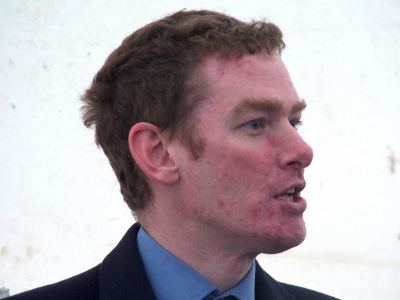
Nick Stanton has been the leader of Southwark Council for the past four years. He represents Riverside Ward which covers the area between the Thames and the railway line from London Bridge in the west to Southwark Park in the east.
His minority Lib Dem administration has relied on the votes of Conservative councillors to approve its budget.
Earlier this month his party launched its campaign to gain overall control of the council at the local elections on Thursday 4 May. We talked to Cllr Stanton about a range of local issues.
"I've no problem conceptually with tall buildings"
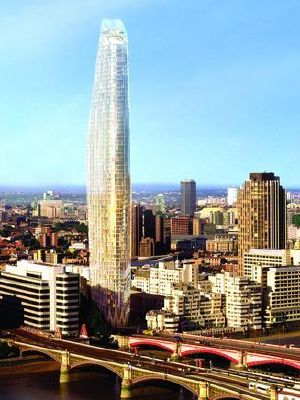
Beetham tower: 1 Blackfriars Road
"I don't want to sound NIMBY-ish about this, because – on the Shard of Glass for example – I've been quite evangelical. I think the Shard is an absolutely fantastic design which will bring really good economic benefits to the area. I have no problem conceptually with tall buildings.
"The problem I think we have in the Blackfriars Road area is that it's not a site that we'd previously designated as one suitable for really tall buildings. We had a paper last year which asked 'would you like to?' and we said 'No we wouldn't thank you very much'. I think what you need is a joint approach with Lambeth which looks at the whole of the Waterloo area. The borough boundary is particularly amorphous around here.
"I think we have to understand that a lot of this development pressure is being driven out of Waterloo; something is going to happen with Waterloo Station. There's this mayoral development framework for Waterloo with an even odder boundary than anything anyone has previously managed to draw up locally."
"I think what's going to be really sensible after the election is for Lambeth and Southwark to try to get together and agree that there's a plan; Blackfriars Road may be one boundary of it; Waterloo Station will be at the centre of it, and say right, where are we going here, let's understand that we're going to see a lot of development pressure, what's the line?
"That will take a year or so to evolve if that happens. In the meantime we'll get the particular planning application for Beetham tower which will fall to be decided on its own merits."
"We want existing businesses at the Elephant to thrive"
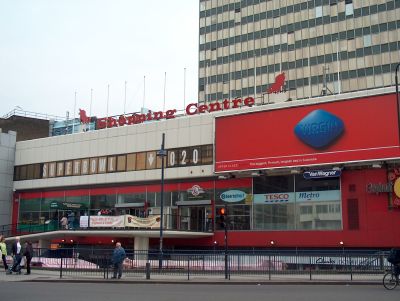
Cllr Stanton says that the concerns of traders at the Elephant and Castle who fear that they will be squeezed out by the regeneration process are "inevitable and understandable". He is sympathetic but defends the record of his administration.
"What we've said is that we want to try to make the Elephant & Castle as attractive a place as we can at the moment for people to come and do their shopping. And that's a problem; it isn't a terribly attractive place and we all know the underpasses aren't terribly nice ... we have done what we can to try to improve the local environment ... it's not our shopping centre, but we've joined in promotions, and so on."
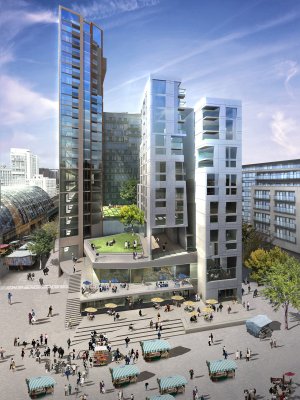
The Oakmayne development on Elephant Road
"We have absolutely guaranteed that there will be affordable business units in all the new builds ... and we've done the first planning permission for the old Volvo garage on the New Kent Road at the back of the shopping centre ... and that includes the first affordable business units on the ground floor on the new main road.
"That's a better package that we've been able to offer to small businesses at the Elephant than the small businesses being displaced by the Olympics are getting.
"We have been very clear with the developers that we want existing businesses at the Elephant to thrive. The whole point of what we are trying to do is to make life better for people who are currently at the Elephant and to get new people in; it's not about getting rid of one lot of people and getting another set of people in.
"The trick we are trying to pull off at the Elephant is a really difficult one, because what everyone agrees is needed is to try to get some of the big chain stores in – the Marks, the Waitroses and the rest of it.
"At the moment most people do their big shopping outside Southwark. Most people who live in Southwark go to Lewisham or Canary Wharf or Oxford Street or Bluewater to do their shopping.
"You've got to have the big shops here, because people do want them and they bring people into the town centre, but we want cheek by jowl with that the diversity, the smaller shops, the specialist shops.
"Frankly, no one woke up last year at Christmas and said 'I've got to do my Christmas shopping and I'm going to the Elephant and Castle to do it'; in 10 years time – if we get this right – they will."
Potters Fields: "the missing jewel in the necklace"
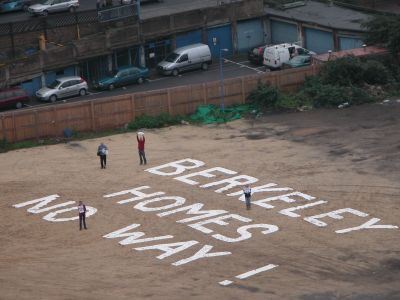
Local residents stage a protest against Berkley Homes' plans for Potters Fields last November
The Lib Dem manifesto includes a pledge to lead "the development of the vacant site between Potters Fields Park and Tower Bridge to include a nationally and internationally-recognised centre for arts and culture". What does this actually mean?
"I think this is as close to a World Heritage Site that any of us are ever going to get to play with.
"In terms of the south bank, you've got – at the moment, anyway – the Design Museum, then you've got this gap – the missing tooth in the jawbone, the missing jewel in the necklace, and then you've got the Globe and the Tate and the South Bank Centre.
"This cries out to me to be the missing link in that south bank walk."
Isn't the idea of an arts and culture centre rather nebulous? "I don't know what it is. I don't know if it's the London Gulbenkian, the new London theatre for the RSC, I don't know if it's the new London photographic gallery, museum, or what it is.
"All I know is that it should be an international-class arts and cultural-type thing that at the moment you can't quite do in London because there just isn't one.
"What we want to do is to go to the international arts and culture market and say 'Is there anyone out there who's got a project and is looking for a fabulous site?' because we've got a fabulous site and we're looking for a fabulous project.
"The good thing that came out of the whole David Blaine debacle was actually ... you get the cameras there and look, you've got the Tower over there and Tower Bridge there, and views of the Gherkin – you've got all of this – it could be a fabulous, mind-blowing thing."
How soon are we likely to see a way forward emerge? "Well hopefully witin the next two or three months. Berkeleys have got their planning permission, but it doesn't do them any good ... because it's mostly our land, so common sense says we and Berkeleys have got to come to a decision to approach this as a joint venture and say 'forget the particular land ownership'.
"I don't want a lapdancing club any more than anyone else"
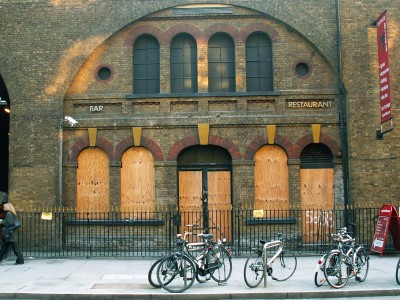
Ken Livingstone says that Southwark Council has "buried its head in the sand" in its interpretation of the new licensing laws, and is backing the Dean of Southwark and others in a legal challenge to the licence for the Rembrandt lapdancing club in Tooley Street. Yet Stanton insists that the council has no power to unilaterally refuse to license adult entertainment:
"All the council's legal advice is that they are wrong. Councils can't simply have a policy that says you don't want lapdancing clubs or don't want strip clubs. And at the time we were consulting on the licensing policy, nobody – least of all the Mayor – suggested that we should.
"What is constantly thrown at us is that it's different in Westminster, and the advice I've had is that ... Westminster has been able to have a saturation policy which essentially says 'we have got enough strip clubs, lapdancing clubs, massage parlours, saunas, brothels and the rest of it, we don't want any more', and that's not an argument we can run in Southwark because you don't have lots and lots of strip clubs and lapdancing clubs.
"If anyone can suggest a way to me that we can legitimately change the licensing policy I'll be more than happy to look at it, because I don't want a lapdancing club any more than anyone else does.
"The conditions, which nobody is reporting, are really tough: no nude dancing before 9 o'clock, no advertising within a mile radius – which I think is actually a really important one."
Antisocial behaviour
Cllr Stanton rejects Labour criticism of a "half-hearted" approach to antisocial behaviour. To the suggestion that Southwark has not sought to obtain as many Asbos as it might, Stanton replies: "It's a very misleading thing to say, because it's not like parking tickets, you have to go to court and persuade a judge to give you an Antisocial Behaviour Order ... we actually have a fairly high success rate ... it's ultimately not our decision whether one is granted. It's a matter for the courts, and that's the way it should be."
He stresses the need to make sure that more resources are put into preventing antisocial behaviour, not just punishing it. He recognises the intimidation some people feel when large groups of youths congregate, but points out that it's a "rite of passage" for teenagers.
Funding for community groups: "Short term-ism is the great enemy"
Cabinet minister David Miliband is calling on local authorities to think longer-term in their funding arragements with community groups. Yet in SE1 organisations like the Bankside Residents Forum have found their council support under threat, putting at risk any sense of continuity or joined-up thinking.
"Short term-ism is the great enemy," concedes Stanton. One of the problems is that you get specific funding through. You have an SRB project which is for five years and that's fine if you fund your Bankside Residents' Forum through it or whatever. And then in five years' time the money dries up and you have to scrabble around at the last minute to find something else to fill it.
"I really hope that over the next four years we can have a really good conversation with the voluntary sector about all sorts of issues. The other one is premises, where it feels to me that a great tide of council money washes out to voluntary sector groups, who rent buildings from the council, and washes back into the council as rent.
"It sometimes feels as if we are funding groups to employ someone to write next year's funding application so we we can give them money, which is an absolutely crazy use of resources on both our parts.
"I'm a great fan of the settlement model, like Blackfriars and Charterhouse, where under one roof you get an incredibly unlikely, diverse range of things going on, but they share the kitchen, the industrial-strength photocopier, there's one set of toilets.
"Instead of five or six groups each having their own premises and writing different grant funding applications for next year's rent review, they can concentrate on doing whatever it is – working with the Irish travellers, doing the community language provision.
"One of the ideas in our manifesto which I'd really like to explore is ... a voluntary sector-led trust to own and manage the council's property portfolio."
Community Councils
A major practical change in the last four years has been the devolution of some council decisions to eight community councils. Stanton is pleased with the range of community groups which have participated in the Bermondsey Community Council on which he sits. "The numbers in Dulwich are absolutely huge; I won't pretend to be an expert on Borough and Bankside." He hails the Cleaner, Greener, Safer programme of funding allocated by community councils as "a fabulous success", pointing to the difference it has made to playgrounds in Borough and Bankside.
"The trick over the next four years is to begin to try to get more onto a 'what we want this area to be like, how are we going to get there?' footing, rather than a reactive, 'this is awful, let's do something about it'; if there's a change of emphasis, I'd like it to be that one."
Public services and population growth
It is clear that the population of North Southwark has grown in recent years, and is likely to continue to expand. How will the council make sure that public services keep pace with that growth?
"Ken Livingstone published the London Plan four years ago. The thinking behind the London Plan was that the economic pressure in London is that we're going to need 700,000 more homes; and therefore the London Plan is all about where we're going to build 700,000 more homes.
"And Ken's line at the time was that this is equivalent to a city the size of Leeds coming to live in London, and my line was 'That's fantastic, Ken, but I've seen Leeds on the telly and I seem to think it's got some schools and some parks and schools and universities and GP surgeries with it'.
"We have done a really comprehensive exercise in crunching through what population growth means in terms of school places and we will need a new secondary school in the north of the borough to cope with the increased population, although more at the Canada Water end than this end. We're keeping the primary school places under constant review.
"I think we have to get better at looking at the leisure facilities, preserving the parks and making them safer for people with families. As a father of two small children myself, I take a keen and active interest in that.
Stanton points to projects such as the skateboard ramp planned for a railway arch at Whites Grounds as the sort of initiative he hopes to encourage.
"One of things that we will do – if and when we're reelected – is to start really going into areas and saying 'how many skateboard ramps does a place like Southwark need?' There's a really good BMX bike track in Peckham which is really well-used by local kids, and you think, well that works in Peckham, but where do you go with your BMX bike in Borough and Bankside? I've no idea, but there isn't an official council track for you to do it.
"We have to look at the whole range of youth provision, from the sport stuff, to the IT stuff, music, drama, performing arts, to try to make sure that in every area there's a really good quality range of stuff. At the moment it's a bit hit and miss, it's what the local youth club happens to provide. We need to be much more systematic about it."
Racism accusations
How does Stanton respond to opponents who insinuate that the council's difficulties over Imperial Gardens, the Ouseley report, Ken Livingstone's referral of the Elephant regeneration to the Commission for Racial Equality and the controversial comments of Chaucer ward councillor Dr Ola, when taken together, indicate that the Lib Dem administration has difficulties with race-related issues?
"I think a lot of it is about the particular difficulty the council has had in responding to the partcular grievance about Imperial Gardens, which ... all predates the last election. It's all about what happened with planning applications before we took over. And one of the problems is that the original allegations were all about fraud and corruption ... we managed this initially as an investigation into fraud and corruption rather than about racism.
"You have a particular man who has a grievience with the council which he says is worth £9 million. He's produced no evidence yet to show how he lost £9 million out of it, but he's very vocal, very determined and won't go away. Short of paying him £9 million – which legally we can't do, and morally I wouldn't anyway – there's nothing we are going to be able to do to shut him up."
• Read our interview with Southwark Labour leader Cllr Peter John
Comments
Share
The SE1 website is supported by people like you
Follow us
Email newsletter
For the latest local news and events direct to your inbox every Monday, you need our weekly email newsletter SE1 Direct.

